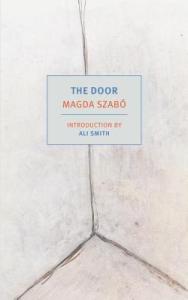The Door was originally published in 1987 in the original Hungarian. The New York Review of Books has released this edition which has been translated by Len Rix.
My Review:
 “Emerence was the sole inhabitant of her empire-of-one, more absolute than the Pope in Rome.”
“Emerence was the sole inhabitant of her empire-of-one, more absolute than the Pope in Rome.”
The Door is about the unlikely relationship forged between two very different women. Magda is a writer and an intellect and the pressures of her schedule force her to seek out a cleaning lady who will keep her home in order while she pursues her career. Emerence, an old woman who lives in their neighborhood in Budapest, is well-known for her intense work ethic as well as her singular personality.
As the book progresses, one wonders why Magda puts up with some of Emerence’s eccentricities. Magda at several points suffers from extremely harsh words and criticism when she argues with Emerence. The housekeeper actually mocks Magda’s faith and religion to the point where Magda sneaks off to Church on Sunday so she will not have to endure Emerence’s verbal attacks. As time goes on it is evident that, although they fight and argue, Magda and Emerence cannot live without each other; their lives are entangled together to the point that they cannot stand to be apart.
Emerence has a plethora of eccentricities, all of which are gradually explained throughout the book. She has an intense fear of thunderstorms, she will only sleep in a loveseat, and she completely objects to religion or faith of any kind. Emerence has also made a lot of money which she is saving up to buy an elaborate crypt in which to be buried. But the most mysterious quirk of hers is the fact that she will not allow anyone, under any circumstances to enter her home. Her door is permanently barred to her family, her close friends and her employer of 20 years.
Throughout the novel, Magda comes to truly care for the old woman and she tries to figure out what is behind the door to Emerence’s apartment. Magda also attempts to get behind the figurative doors that Emerence has put up in order to emotionally protect herself from other people. Can Magda ever truly break down these barriers and obtain the close and tender relationship with Emerence that she so desires? Or will Magda’s attempts to break down these literal and figurative doors end up destroying this woman whom she has come to love as family?
THE DOOR is a unique and intense novel about relationships, loyalty, and love which I highly recommend. Thanks to the New York Review of Books for bringing this brilliant Hungarian author to our attention.
About The Author:
Magda Szabó was a Hungarian writer, arguably Hungary’s foremost woman novelist. She also wrote dramas, essays, studies, memories and poetry.
Born in Debrecen, Szabó graduated at the University of Debrecen as a teacher of Latin and of Hungarian. She started working as a teacher in a Calvinist all-girl school in Debrecen and Hódmezővásárhely. Between 1945 and 1949 she was working in the Ministry of Religion and Education. She married the writer and translator Tibor Szobotka in 1947.
She began her writing career as a poet, publishing her first book Bárány (“Lamb”) in 1947, which was followed by Vissza az emberig (“Back to the Human”) in 1949. In 1949 she was awarded the Baumgarten Prize, which was – for political reasons – withdrawn from her on the very day it was given. She was dismissed from the Ministry in the same year.
During the establishment of Stalinist rule from 1949 to 1956, the government did not allow her works to be published. Since her unemployed husband was also stigmatized by the communist regime, she was forced to teach in an elementary school within this period.
Her first novel, Freskó (“Fresco”), written in these years was published in 1958 and achieved overwhelming success among readers. Her most widely read novel Abigél (“Abigail”, 1970) is an adventure story about a schoolgirl boarding in eastern Hungary during the war.
She received several prizes in Hungary and her works have been published in 42 countries. In 2003 she was the winner of the French literary prize Prix Femina Étranger for the best foreign novel.



This sounds fascinating! It reminds me of another book, Astrid and Veronika by Linda Olsson, about two women who become neighbors in a Swedish village. One of them keeps to herself in a reclusive way–until she becomes ill and her neighbor comes over to help her. Here’s a review of it: http://www.nytimes.com/2007/04/01/books/review/Harleman.t.html I think you might like this one too!
LikeLiked by 1 person
Thanks for the recommendation! I’ve been reading a lot of lit. in translation lately and enjoying it!
LikeLiked by 1 person
The characters in this book sound very strange and quirky! I’d love to read more translated fiction, so I’ll be keeping this one in mind 🙂
LikeLiked by 1 person
I would definitely recommend this one! It was a page turner because I wanted to know what happened between these two very strong, yet different characters. Thanks for stopping by!
LikeLiked by 1 person
Pingback: 21015: A Banner Year for Indie Presses |